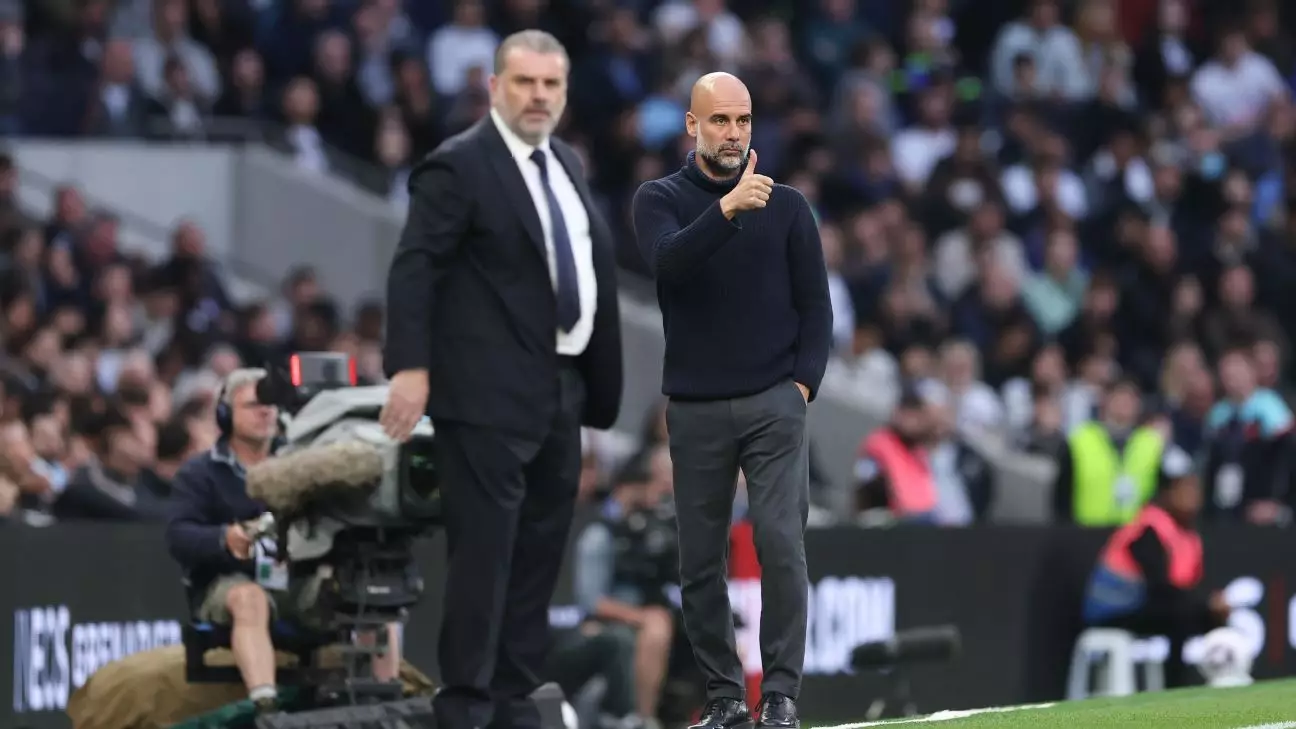Ange Postecoglou, the ambitious manager of Tottenham Hotspur, has made headlines recently by expressing his eagerness to compete against Pep Guardiola’s Manchester City, especially following Guardiola’s recent extension with the club. Manchester City confirmed that the acclaimed manager would remain with them until 2027, putting him on the path to potentially secure a fifth consecutive Premier League title. This kind of sustained success sets a high bar not only for City’s rivals but also for football as a whole. Postecoglou’s comments shed light on the mindset of a coach who aims not merely to exist within the league’s framework but to elevate his team to serious contention for silverware.
Postecoglou’s philosophy revolves around recognizing and aspiring to greatness. Rather than lamenting Guardiola’s continued presence at Manchester City, he perceives it as a motivating factor that fuels his ambition. He verbalized his thoughts during a press conference, stating, “Imagine you knock him off? That would be something.” In essence, he fosters an environment where competition with giants is not feared but embraced. This reflects a progressive attitude in sports where excellence is not just admired, but used as a stepping stone toward personal and professional growth.
Describing the feeling of striving against a formidable opponent, Postecoglou highlights an intrinsic drive that him and his team experience in the face of seemingly insurmountable challenges. This perspective is particularly significant in the sporting vein, as it encourages aspiring athletes and teams to elevate their standards and push boundaries.
Postecoglou’s journey has been characterized by experiences that oscillate between equal opportunity and the frustration of complacency. He draws from his past experiences in Australian sports to illustrate his point. While he acknowledges the benefits of a competitive landscape where every team believes they can win, he also notes the frustration that can arise when excellence remains within a ‘capped’ domain. It’s a reflective commentary on how leagues that lack an overwhelming force can sometimes breed mediocrity rather than stimulate ambition.
In contrast, the presence of teams like Manchester City engenders a relentless pursuit of excellence that not only raises the level of competition but challenges all involved parties to rise above their previous achievements. This internal drive to “bridge the gap” against a dominant force is crucial for any team hoping to ascend the ranks of football hierarchy.
Postecoglou’s comments weren’t confined to the competitive aspect of football; he also addressed issues concerning officiating and integrity within the Premier League. Following revelations about referee David Coote’s alleged misconduct, Postecoglou voiced a measured and reasonable outlook. While he recognized Coote’s errors and expressed concern for his wellbeing, he maintained faith in the integrity of the officiating system.
His proactive stance—that one person’s mistakes do not define an entire system—underscores a broader principle applicable to all areas, including leadership and management. This perspective fosters a culture of accountability while simultaneously encouraging growth and forgiveness, which can be vital in high-stakes environments like professional sports.
Ultimately, Ange Postecoglou represents a refreshing approach in football management, focusing on the quest for excellence and accountability. His willingness to embrace challenges from formidable opponents like Pep Guardiola is indicative of a forward-thinking philosophy that could potentially revitalize Tottenham Hotspur’s aspirations in the competitive landscape of the Premier League. By nurturing an environment where challenges are met with enthusiasm rather than trepidation, Postecoglou not only aims to elevate his team but also sets a standard for others in the field. In the volatile world of football, where successes and failures can intertwine, this outlook towards competition, integrity, and growth remains invaluable.
